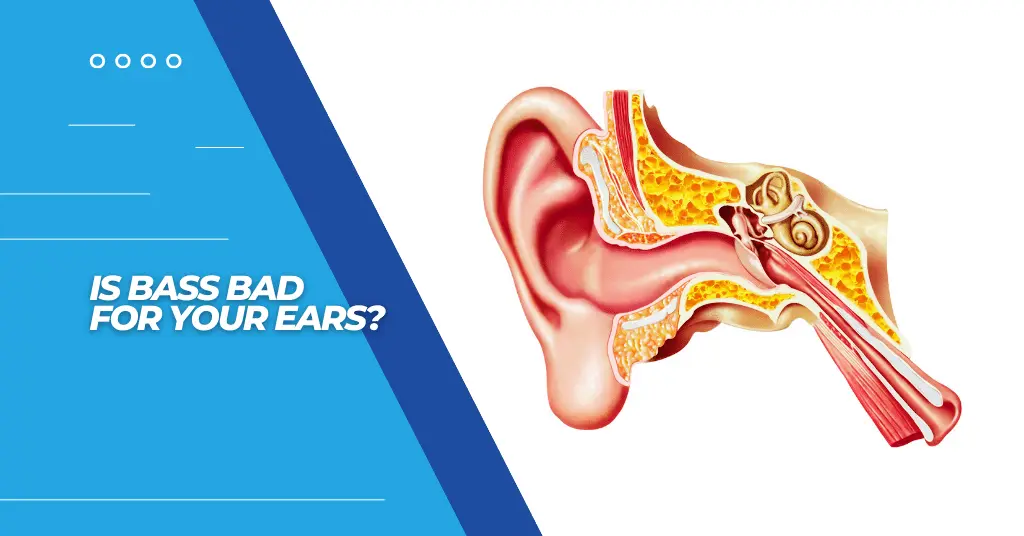Is Bass Bad for Your Ears?

If you’re an avid music listener, you may wonder if bass can harm your ears. After all, it’s the loudest sound in most tracks, and many people turn up their subwoofers to hear it more clearly.
Today’s article will be interesting as I have taken the step forward to ensure my readers can enjoy the deep bass from their subwoofers without damaging health.
The volume at which you listen to it plays a role; anything above 85 decibels (dB) can damage your hearing over time (If you listen without breaks). Keep up with me till the end!
How Do Your Ears Work?
Let’s know about the ear’s functionality first! The impressive organ, the human ear, helps us hear and maintain our sense of balance.
Sound waves travel through the air and are collected in the visible outer ear before traveling down a narrow tube called the ear canal.
As they reach the end of this canal, these waves cause a thin membrane called an eardrum to vibrate. The sound vibrations then move into three tiny bones in the middle ear (known as ossicles), amplifying them and letting them enter the inner ear.
In here lies two systems: one known as the cochlea, which contains fluid and tiny hairs; when sound waves reach this area, they cause its fluids to move, stimulating these hair cells, which then convert sound into electrical signals sent via an auditory nerve to our brain; this processes and interprets it as actual sound, giving us our hearing capabilities.
Our other system within the inner year is called vestibular; used for maintaining equilibrium until electrical signals from both ears coincide with the existing head position or motion for us to be aware of what’s happening around us.
Can Bass Damage Your Ears?
Yes, bass can damage your ears because of its lower frequency range than other sounds. When you expose your ears to loud or prolonged bass levels for an extended time, the hair cells in your inner ear can become fatigued and even die off, resulting in permanent hearing damage or hearing loss. However, a normal bass level isn’t bad for your ears.
What Is Bass and How Does It Affect Your Ears?
As mentioned above, bass refers to low-frequency sounds that range from around 20 Hz to 250 Hz and are created by musical instruments such as drums, bass guitars, and subwoofers.
When heard in large or prolonged volumes, these bass frequencies can produce sound vibrations in the body and ears. If exposed to loud or frequent levels of this sound, it can damage the delicate hair cells located within our inner ear, which convert sound waves into electrical signals sent directly to our brain.
Hearing loss can result when this happens; other symptoms include tinnitus (ringing in the ears) or further hearing difficulties. Therefore it is essential to take care when listening to any music at a high volume level, especially those with lots of bass frequencies included – as long-term exposure may have severe consequences on one’s ability to hear correctly.
6 Potential Risks of Hearing Loud Bass Music:
Here I have discussed some potential damages due to bass-heavy music:
1. Noise-Induced Hearing Loss:
The louder the sound, the shorter it takes for hair cells in the inner ear to become damaged. This damage can occur even without long-term exposure, but over time it accumulates, leading to severe hearing problems such as tinnitus and total deafness.
2. Tinnitus:
Exposure to loud bass music can also lead to a persistent ringing or buzzing sound known as tinnitus. The intensity of the bass can be damaging even at relatively low volumes when heard over extended periods and is usually caused by sustained exposure to sound levels over 85 decibels, similar to the noise level of a lawnmower. Tinnitus is often temporary but may become permanent if not treated properly.
3. Physical Discomfort:
Listening to loud bass music can also cause physical discomforts, such as pain, pressure, or a feeling of fullness in the ears. It can also be uncomfortable for those who are sensitive to loud noises.
The low frequencies from the bass sound waves vibrate through your body and can even cause headaches and dizziness due to prolonged exposure.
4. Increased Stress:
Hearing loud bass can also cause stress and anxiety, negatively affecting mental health and well-being. The intense sound waves created by the music penetrate deep into the body, causing increased adrenaline levels, leading to an increase in stress hormones like cortisol. Also, loud bass music can disrupt sleep patterns and lead to fatigue, further worsening stress levels.
5. Disrupting Sleep:
Loud bass music, when listened to at night, can disrupt sleep patterns significantly. This is because loud and sustained noise can potentially override natural neural mechanisms necessary for efficient sleep.
This means that individuals could experience difficulty falling asleep, restless sleep, or even shorter than regular sleeping periods due to disruption caused by the loud bass music.
6. Physical Injury:
Excessive, prolonged listening to loud bass music can lead to physical injuries such as damage to the eardrum and other structures in the ear.
When sound waves are louder than what the human ear is used to, it can distort tiny hair cells in the inner ear that send signals to the brain for hearing.
This damage can be permanent if not addressed immediately and often manifests as impaired hearing or ringing/buzzing sounds in an affected person’s ears.
7 Tips to Prevent Hearing Damage Due to Bass:
Here are my tips for those who are concerned about their ears’ safety:
1. Wear Earplugs:
Ear plugs can help to protect your hearing from the damaging effects of loud bass music. When you’re in an event, such as a concert or music festival, you don’t have any control over reducing the bass levels.
Therefore, earplugs can be really efficient in such a way. They act as a barrier between your ears and the sound of the music, reducing its intensity and preventing it from reaching potentially dangerous levels.
Wearing earplugs when exposed to prolonged periods of loud bass will help reduce your risk of hearing loss, ringing in the ears, or other audio impairments over time.
2. Use Noise-Canceling Headphones:
Well! I am a subwoofer expert, but still, for your health and safety, I’m asking you to get noise-canceling headphones. Noise-canceling headphones are specifically designed to block out external sounds, allowing you to enjoy music at lower volumes.
This reduces the risk of hearing loss caused by exposure to loud bass, as you don’t have to turn up the volume level to hear your favorite tunes over background noise.
Noise-canceling headphones can also help prevent tinnitus by minimizing Phantom Ear Sounds (PES). PES is a phantom sound that can be heard when ambient noise surrounds you while listening on regular headphones.
3. Reduce Volume:
Well! That’s the straightforward solution. Reducing the volume of your music is one of the most effective ways to protect against hearing loss due to bass sounds.
This is because loud bass frequencies can cause damage to your delicate inner ear structures, leading to decreased audiometric thresholds and eventual hearing loss.
To reduce risk, keep music at a reasonable level that does not interfere with conversation or other nearby sound sources.
4. Limit Exposure:
If you already experience hearing damage or discomfort symptoms, it is best to reduce bass exposure as much as possible. Listening at lower volumes and taking regular listening breaks can help protect your ears from long-term damage.
As mentioned, prolonged exposure to high bass levels can lead to permanent hearing loss, so always wear earplugs when attending events with loud bass music.
5. Avoid Loud Environments:
Bass frequencies are high energy and can cause the most damage out of all sound frequencies if not appropriately regulated. When exposed to a loud environment, it is hard for your eardrums to cope with the sound intensity, which leads to harm.
The best way is to avoid these situations and wear protective headgear, such as noise-canceling earmuffs or headphones, when you cannot leave a noisy area.
6. Use a Crossover:
A crossover is a way to divide the audio signal into separate frequency ranges, sending the lower frequencies to a subwoofer and high-frequency sounds through full-range speakers.
Using these crossovers, you can deliver the bass without breaching certain sound levels that can exceed safe decibel levels for human ears. This helps prevent hearing loss and other auditory issues related to prolonged exposure to loud noises.
7. Take Breaks:
Loud music, even at moderate levels, can cause damage over time. Taking a break allows your ears to recover and lets them adjust to the sound around you.
It also reduces the amount of time your ears are exposed to loud music or noise for extended periods so that damage does not occur. Take regular breaks every 20-30 minutes or as needed for prolonged listening sessions to protect your hearing.
Do Subwoofers Damage Hearing?
Yes, subwoofers can cause hearing damage. The low-frequency soundwaves produced by subwoofers have the potential to reach high volume levels and cause short and long-term damage to your ears.
As mentioned above, prolonged exposure to loud bass or other sounds can lead to hearing loss, tinnitus, and vertigo. It is essential to protect your ears when using a subwoofer by setting appropriate volume limits for yourself and taking frequent breaks from listening to prevent permanent hearing damage.
How Loud Should the Bass Be to Prevent Damage to Your Ears?
You should keep the bass volume as low as possible to prevent ear damage. Listening at 80 decibels for up to eight hours or more daily can cause hearing loss.
To put this into perspective, the sound level in a quiet home is usually between 30-60 decibels. I generally recommend keeping the volume low and taking regular breaks from listening, especially with vocal music or louder genres like rock and EDM, which are typically higher in volume.
A good rule of thumb is that if you can feel the vibration of your bass without putting it through a speaker system, then it’s too loud!
General FAQs
Is Loud Bass Bad for You?
Yes, loud bass can be bad for you. Long-term exposure to loud bass can damage hearing and lead to tinnitus, which causes ear ringing. Listening at high volumes for too long can also cause dizziness and headaches.
Why Does Bass Hurt My Ears?
The sound of bass can be uncomfortable due to the frequency and intensity. The bass and low frequencies can cause sound vibrations, damaging the hearing and increasing the risk of tinnitus or hearing loss. To protect your ears, turn down the bass or use earplugs when listening to loud music.
Is Bass or Treble Worse for Your Ears?
Both (high-pitched sounds) can cause temporary or permanent hearing damage by overexposing your ears to loud sounds. The key is moderation and finding a balance between both types of sound for maximum listening pleasure without risking harm to your ears.
Does Bass Cause Hearing Loss?
Yes, exposure to loud bass at high levels can lead to temporary or permanent hearing loss. Listening to loud music or attending noisy events without proper ear protection can cause significant damage to the delicate sensory cells in the inner ear and lead to hearing loss.
